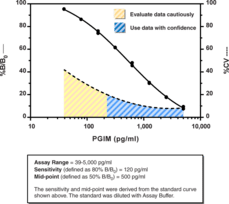Territorial Availability: Available through Bertin Technologies only in France
- Correlated keywords
- assay measure measured measurement ELISA enzyme immunoassay immunosorbent prostaglandin PGIM competitive quantification urine sample matrix
- Product Overview:
Prostaglandin I (Prostaglandin I2; PGI2) is a potent vasodilator and inhibitor of platelet aggregation that is formed from arachidonic acid primarily in the vascular endothelium and renal cortex by sequential activities of cyclooxygenase (COX) and PGI2 synthase. It is non-enzymatically hydrated to 6-keto PGF1? (t1/2 = 2-3 minutes), and then quickly converted to numerous downstream metabolites, collectively known as prostaglandin I metabolites or PGIM, (t1/2 = 30 minutes). Although 6-keto PGF1? is commonly measured in plasma and urine as an estimate of PGI2 synthesis, it should be noted that there may be more than one source of PGI2 in these samples. For instance, urinary concentrations of 6-keto PGF1? are confounded by the fact that only a portion originates from plasma and the remainder is produced by the kidney. These problems are circumvented by measuring downstream PGIM rather than 6-keto PGF1? as an indicator of systemic PGI2 production. Cayman’s PGIM ELISA Kit is a competitive assay that can be used for quantification of PGIM in urine and other sample matrices. The assay has a range from 39-5,000 pg/ml and a sensitivity (80% B/B0) of approximately 120 pg/ml.
Cayman Chemical’s mission is to help make research possible by supplying scientists worldwide with the basic research tools necessary for advancing human and animal health. Our utmost commitment to healthcare researchers is to offer the highest quality products with an affordable pricing policy.
Our scientists are experts in the synthesis, purification, and characterization of biochemicals ranging from small drug-like heterocycles to complex biolipids, fatty acids, and many others. We are also highly skilled in all aspects of assay and antibody development, protein expression, crystallization, and structure determination.
Over the past thirty years, Cayman developed a deep knowledge base in lipid biochemistry, including research involving the arachidonic acid cascade, inositol phosphates, and cannabinoids. This knowledge enabled the production of reagents of exceptional quality for cancer, oxidative injury, epigenetics, neuroscience, inflammation, metabolism, and many additional lines of research.
Our organic and analytical chemists specialize in the rapid development of manufacturing processes and analytical methods to carry out clinical and commercial GMP-API production. Pre-clinical drug discovery efforts are currently underway in the areas of bone restoration and repair, muscular dystrophy, oncology, and inflammation. A separate group of Ph.D.-level scientists are dedicated to offering Hit-to-Lead Discovery and Profiling Services for epigenetic targets. Our knowledgeable chemists can be contracted to perform complete sample analysis for analytes measured by the majority of our assays. We also offer a wide range of analytical services using LC-MS/MS, HPLC, GC, and many other techniques.
Accreditations
ISO/IEC 17025:2005
ISO Guide 34:2009
Cayman is a leader in the field of emerging drugs of abuse, providing high-purity Schedule I-V Controlled Substances to federally-licensed laboratories and qualified academic research institutions for forensic analyses. We are certified by ACLASS Accreditation Services with dual accreditation to ISO/IEC 17025:2005 and ISO Guide 34:2009.





